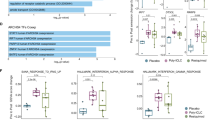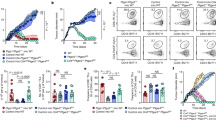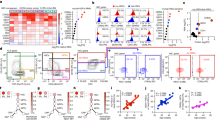Abstract
THE immune response of rodents to malaria is thymus dependent. Plasmodium berghei infections are more severe in neonatally thymectomised rats than in intact controls1, whereas P. yoelii (P. berghei yoelii) infections which are self-resolving in normal CBA mice prove fatal in T-cell deprived CBA mice (Jayawardena et al., unpublished) or congenitally athymic nude mice2. Malarial infections are also known to depress immune responses to certain antigens. In the mouse, they reduce the antibody3 and splenic plaque forming cell4 response to sheep red blood cells (SRBCs), render animals more susceptible to lymphomagenic viruses5, and severe long term infections prolong xenogeneic skin graft survival time6. It has been suggested that such impaired immune reactivity reflects defective lymphocyte or macrophage function, but there has been no unequivocal evidence in support of these possibilities.
This is a preview of subscription content, access via your institution
Access options
Subscribe to this journal
Receive 51 print issues and online access
$199.00 per year
only $3.90 per issue
Buy this article
- Purchase on Springer Link
- Instant access to full article PDF
Prices may be subject to local taxes which are calculated during checkout
Similar content being viewed by others
References
Brown, I. N., Allison, A. C., and Taylor, R. B., Nature, 219, 292–293 (1968).
Clarke, I. A., and Allison, A. C., Nature, 252, 328–329 (1974).
Salaman, M. H., Wedderburn, M., and Bruce-Chwatt, L. J., J. gen. Microbiol., 59, 383–391 (1969).
Greenwood, B. M., Playfair, J. H. L., and Torrigiani, G., Clin. exp. Immunol., 8, 467–478 (1971).
Wedderburn, N., Lancet, ii, 1114–1116 (1970).
Sengers, R. C. A., Jerusalem, C. R., Doesburg, W. H., Expl Parasitol., 30, 41–53 (1971).
Leuchars, E., Cross, A. M., and Dukor, P., Transplantation, 3, 28–38 (1965).
Doenhoff, M. J., and Davies, A. J. S., Cell. Immun., 2, 82–91 (1971).
Ford, C. E., in Tissue Grafting and Radiation (edit. by Micklem, H. S., and Loutit, J. F.), 197–206 (Academic, New York and London, 1966).
Voller, A., Bull. Wld Hlth Org., 30, 343–354 (1964).
Thompson, S. W., Selected Histochemical and Histopathological Methods (Thomas, Srpingfield, Illinois, 1966).
Doenhoff, M. J., Davies, A. J. S., Leuchars, E., and Wallis, V. J., Proc. R. Soc., B 176, 69–85 (1970).
Doenhoff, M. J., Clin. exp. Immunol., 8, 603–615 (1971).
Asherson, G. L., and Ptak, W., Immunology, 15, 405–416 (1968).
Voller, A., Gall, D., and Manawadu, B. R., Z. Tropenmed. Parasitol., 23, 152–155 (1972).
O'Toole, C. M., and Davies, A. J. S., Nature, 230, 187–188 (1971).
Author information
Authors and Affiliations
Rights and permissions
About this article
Cite this article
JAYAWARDENA, A., TARGETT, G., LEUCHARS, E. et al. T-cell activation in murine malaria. Nature 258, 149–151 (1975). https://doi.org/10.1038/258149a0
Received:
Accepted:
Issue Date:
DOI: https://doi.org/10.1038/258149a0
This article is cited by
-
Cytokine and antibody production during the course of resolution in Plasmodium yoelii 17XL-infected BALB/c mice treated with febrifugine and isofebrifugine mixture from leaves of Hydrangea macrophylla var. Otaksa
Parasitology Research (2004)
-
Quantitative estimation of suppressor/cytotoxic and helper T cells during acute and chronic Plasmodium berghei infection
Immunology & Cell Biology (1990)
-
Cell mediated immunity in childhood malaria
The Indian Journal of Pediatrics (1990)
-
Immunology of malaria
The Indian Journal of Pediatrics (1985)
-
Enhanced expression of H–2K and H–2D antigens on reticulocytes infected with Plasmodium yoelii
Nature (1983)
Comments
By submitting a comment you agree to abide by our Terms and Community Guidelines. If you find something abusive or that does not comply with our terms or guidelines please flag it as inappropriate.



